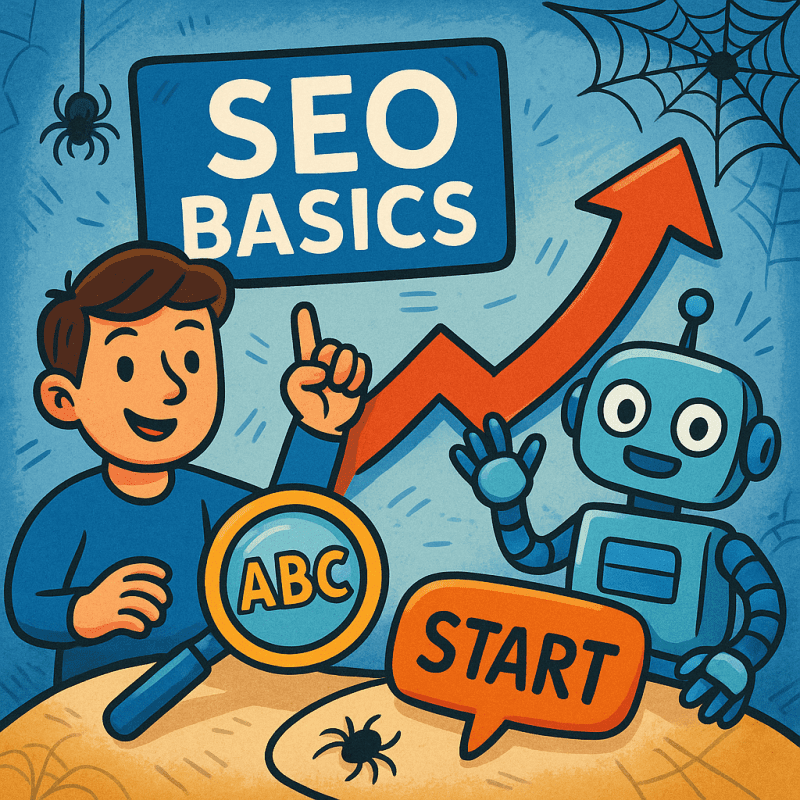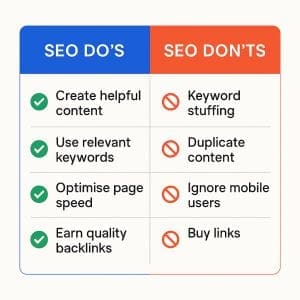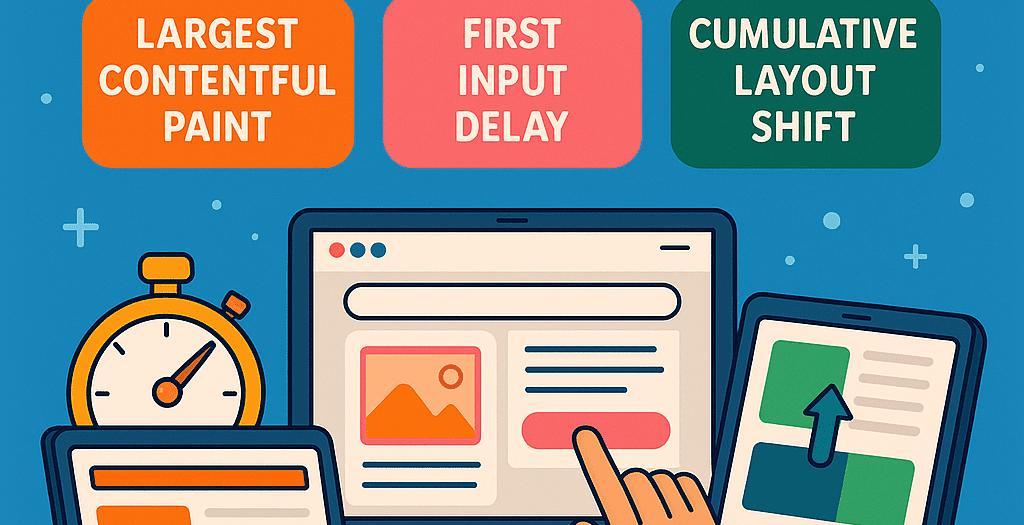Search Engine Optimisation (SEO) may sound intimidating, but at its core, it’s simply about helping people find your website when they search on Google (or other search engines).
In this guide, we’ll walk you through the basic concepts in plain English – no tech jargon, no confusing acronyms, just straightforward advice you can actually use.

🔍 What Is SEO?
SEO stands for Search Engine Optimisation. It’s the process of improving your website so that it ranks higher in search results. The goal? Get more people to visit your site without paying for ads.
When someone types a query into Google, the search engine scans the internet to deliver the most relevant, helpful results. SEO is what helps your website show up on that results page – ideally near the top.
🎯 Why Does SEO Matter?
Here’s why SEO should be on your radar:
- 📈 More traffic: Higher rankings = more people clicking on your site.
- 💷 Free marketing: Organic traffic means you’re not paying for every visitor.
- ✅ Credibility: People trust sites that appear at the top of Google.
- 📊 Data-driven: SEO gives you insights into what your audience is looking for.
🧠 How Search Engines Work
Search engines like Google use automated programs called crawlers (or “bots”) to scan and index the content of websites. Here’s a simplified breakdown of the process:
- 🔎 Crawling: Bots explore your website to see what’s there.
- 📚 Indexing: The pages they find are added to Google’s huge database (its “index”).
- ⚖️ Ranking: When someone searches, Google chooses the best-matching pages to display – using hundreds of ranking factors.
🔑 Key SEO Basics Everyone Should Know
🏷️ 1. Keywords
Keywords are the words and phrases people type into search engines. If you want your page to appear in the results, it needs to match what your audience is searching for. For example, if someone searches for “best pizza in Liverpool”, your page should include that phrase naturally in the content.
🏗️ 2. On-Page SEO
This refers to the elements you can control on your own website:
- 🧾 Title tags and meta descriptions
- 🔗 Internal linking (linking between pages on your site)
- 📄 Content that’s helpful, well-written, and answers user questions
- 📱 Mobile-friendly design
- 🚀 Fast loading times
🌍 3. Off-Page SEO
This is what happens away from your site, like:
- 🔗 Backlinks (when other websites link to yours)
- 💬 Social media mentions
- 🤝 Online reviews and reputation
🧹 4. Technical SEO
This involves the nuts and bolts of your website that help search engines crawl and index your pages correctly. Don’t worry – you don’t need to be a developer. Just be aware of the basics:
- 🗺️ XML sitemaps
- 🚫 No broken links or missing pages (404 errors)
- 🔐 Secure site (HTTPS)
- 📱 Mobile responsiveness
🧩 How Do I Start With SEO?
If you’re new to this, here are a few simple steps to begin:
- 🔧 Set up Google Search Console and Google Analytics
- 📝 Make sure each page on your site has a clear purpose and a relevant keyword
- 📸 Use headings (H1, H2, etc.) to structure your content
- 📎 Add internal links between your pages
- 🔗 Try to earn backlinks from trustworthy sources
You don’t have to do everything at once – small steps add up!
🧭 What to Avoid in SEO
There are a few common pitfalls that can harm your rankings:
- 🚫 Keyword stuffing (cramming your page full of keywords)
- 👻 Hidden text or sneaky redirects
- 📑 Duplicate content (copying content from other sites)
- ⚠️ Spammy backlinks from low-quality websites

Google is smarter than ever — it rewards helpful content and punishes shady tactics.
📌 Final Thoughts
Search-engine optimisation is less about hacking algorithms and more about serving your visitors. When pages load quickly, answer real questions and slot neatly into a clear site structure, Google has every reason to rank them. Think of SEO as three overlapping tasks.
First, polish your on-page foundations: meaningful headings, descriptive meta tags and content that speaks your customers’ language rather than robot-like keyword strings.
Next, earn credibility beyond your own domain – quality backlinks, brand mentions and genuine reviews act as votes of confidence.
Finally, keep the technical plumbing sound: mobile-friendly design, tidy URLs, SSL security and a sitemap that signposts everything clearly.
You don’t need to master everything at once. Pick one quick win each week – rewrite an old blog post for clarity, compress heavy images, approach a partner for a guest article – and track the impact in Google Search Console.
Small, consistent improvements compound over time, delivering traffic that advertising budgets can’t match.
Avoid shortcuts that promise overnight gains; they usually lead to penalties or wasted effort. Commit to steady, user-centred optimisation and you’ll build a search presence that attracts the right audience and turns curiosity into long-term customers.
🔁 Up Next!
On-Page SEO – On-page SEO (also known as on-site SEO) is the process of optimising individual web pages to rank higher and earn more relevant traffic in search engines.
❓ SEO Basics: Real Questions People Ask
What’s the first thing I should do when starting SEO?
The best place to start is by understanding who your audience is and what they’re searching for. Then you can research keywords, optimise key pages, and make sure your site is fast and mobile-friendly.
How do I know if SEO is actually working for my site?
You’ll start to see more organic traffic, higher rankings on Google, and ideally more leads or sales. Tools like Google Search Console and Google Analytics can help track this over time.
Is SEO something I can do myself, or do I need an expert?
You can absolutely do SEO yourself – especially with beginner-friendly resources like this one. Just take it step by step and stay consistent. As your site grows, you might choose to bring in expert help.
What are some easy SEO wins I can do today?
Start by fixing broken links, adding descriptive page titles and meta descriptions, compressing large images, and making sure your homepage answers your visitors’ top questions clearly.
How long does it take for SEO changes to show results?
In most cases, you’ll need to wait several weeks or even a few months to see noticeable results. SEO is a long-term strategy, not a quick fix – but it pays off with lasting traffic and visibility.
Do I really need to worry about keywords in 2026?
Yes – but think less about stuffing exact phrases and more about covering topics naturally. Google understands meaning better now, so focus on answering your visitors’ real questions.
Can I just use AI to write all my SEO content?
AI tools like ChatGPT can help speed up content creation, but you still need human input to guide strategy, ensure accuracy, and make your brand voice stand out. Use AI smartly – not lazily.
What’s the difference between on-page and off-page SEO?
On-page SEO is everything you control on your site – like content, titles, images, and structure. Off-page SEO is about signals elsewhere, like backlinks from other sites and social proof.
Do meta descriptions help with rankings?
Not directly – but a strong meta description can improve your click-through rate, which indirectly helps SEO by showing Google your result is useful and relevant to searchers.
Is there a free tool that tells me how my SEO is doing?
Yes – start with Google Search Console. It’s free, easy to set up, and shows how your site performs in search results, including what people search to find you and where you can improve.
You don’t need a degree in computer science to rank on Google. You just need the right guide. – David Roche
Video Recap – 📘 SEO Basics Explained – Learn How to Rank on Google
If SEO sounds complicated, you’re in the right place. In this video, I’ll explain the SEO basics in plain English – what it is, how it works, and what you can do today to start ranking higher on Google.








